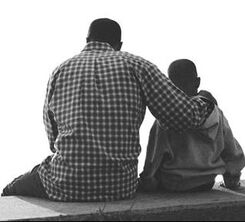 James Emery White, in his book Meet Generation Z stated, “As the first truly post-Christian generation, and numerically the largest, Generation Z will be the most influential religious force in the West.” Author Jonathan Morrow explained that Gen Z is growing up in a world that rejects a Christian worldview, but desires the world that has the characteristics that biblical principles allow to exist. In addition, young believers often lack the education and discipleship that allow them to understand how faith applies in real life. As America becomes increasingly post-Christian, church attendance and biblical literacy are on the decline. Data from the General Social Survey and the Pew Research Center corroborated a downward trend in church attendance in the U.S. “In the most recent GSS studies, 43% of respondents say they attend religious services at least monthly, down from 47% in the early 2000s and 50% in the early 1990s. Meanwhile, the share of U.S. adults who say they “never” attend religious services now stands at 27%, up from 18% in the early 2000s and roughly double the share who said this in the early 1990s (14%).” A LifeWay Research study found that only 45 percent of those who regularly attend church actually read the Bible more than once a week and almost one in five churchgoers say they never read the Bible. Barna reported, “Since 2009, Bible reading has become less widespread, especially among the youngest adults. Today, only one-third of all American adults report reading the Bible once a week or more. The percentage is highest among Elders (49%) and lowest among Millennials (24%).” As we seek to encourage young people in their faith, we must recognize that they may not possess a basic understanding of healthy spiritual growth. As a result, they need intentional training, encouragement, and mentoring. Even young believers with a strong faith, who desire to grow spiritually, often confront opposition to their faith that did not exist in our culture a couple of decades ago. David Kinnaman and Mark Matlock, in their book Faith for Exiles, contended that “today’s society is especially and insidiously faith repellent.” They reported that it is hard to grow resilient faith in this generation of young people growing up in a post-Christian culture. It is possible, however. Here are a few of the strategies we can employ as we seek to encourage spiritual growth in the lives of young people around us:
0 Comments
 I was recently presenting on Gen Z, discussing the impact of cancel culture on young people today. Someone in the audience asked what cancel culture is so thought I would talk about it briefly here. The Cambridge Dictionary defines it as: "a way of behaving in a society or group, especially on social media, in which it is common to completely reject and stop supporting someone because they have said or done something that offends you." While cancel culture is currently playing out in significant ways in our society as anyone from celebrities to CEOs can get "cancelled" for saying or doing something that is offensive to someone or a group of people, it is also a very real part of young people's personal lives. A 2019 New York Time's article, Tale's From the Teenage Cancel Culture, offered some powerful quotes from teenagers on the effects of cancel culture. Neelam, a 17-year-old explained, cancel culture is "a way to take away someone’s power and call out the individual for being problematic in a situation,” Neelam said. "I don’t think it’s being sensitive. I think it’s just having a sense of being observant and aware of what’s going on around you." The article quotes another 17-year-old, Ben, who highlights one of the difficulties of cancel culture. He said, "people should be held accountable for their actions, whether they’re famous or not, but that canceling someone 'takes away the option for them to learn from their mistakes and kind of alienates them.'” The Cambridge Dictionary agreed that "the main argument against cancel culture is that it doesn't enable people who have wronged society the opportunity to apologize and learn from their mistakes." Young people today are often living in fear of saying or doing something, or associating with someone or something, that could get them cancelled. They can also struggle with understanding the power of unconditional love, repentance, forgiveness, restoration and redemption in a culture that simple cancels those who make mistakes or do something that is deemed inappropriate or offensive. As parents, leaders, and mentors, we need to model the reality that love, forgiveness, and restoration can exist in relationships. By providing relationships that are strong, safe, and supportive, we can help young people gain perspective and hope to live humbly, honestly, and confidently. For more on this topic, check out this month's episode of The Leading Tomorrow podcast.  I have missed seeing many of you in person this year as face-to-face events have been canceled and schedules have changed. Like many public speakers, my calendar looked strangely different after travel restrictions began to take effect in March. In this unique season, I have often found myself, like so many leaders, pondering what the future holds and how to navigate it. Amid all the uncertainty and change, I have been encouraged and challenged by the following reminders and questions:
 During two decades of teaching in both K-12 and college contexts, I have had to adapt a lot of my teaching strategies to the many changes we are seeing in technology and students today. I have taught online courses for several different schools and developed a deep appreciation for the opportunities that exist in virtual classrooms. I believe virtual learning can provide opportunities that are unique to the online setting. As you engage students online, here are a few keys that I find essential to effective online education: Key 1: Allow for Choice When we have some choice in a situation, we tend to feel more motivated. As a result, I often give options for assignments. For example, sometimes students can choose between participating in a written online forum discussion (introverts tend to prefer this!) or a live virtual discussion (verbal processors love this!). On some activities, I allow submissions to be either written or a recorded video. They can often choose between a paper or a project. I also like to give some freedom, when possible, for students to choose topics or applications to explore in course assignments. Key 2: Encourage Student Ownership Sometimes students prefer that instructors do the hard work of teaching and providing feedback but engaging them in these processes ensures better learning. I like using peer reviews, student-led presentations, and group activities to maximize student ownership in learning. Key 3: Get Feedback! The greatest contribution to my learning as an online educator has been student feedback. I do at least one mid-course feedback survey/form with open-ended questions, in addition to final course evaluations, in every class I am teaching. I ask the following: what is working, what is not, what would improve your learning experience? I immediately respond to areas of concern and make changes to the course based on helpful student input. Students value that I listen to them and care about their learning experience. Key 4: Learn from Colleagues I have found solutions to so many of my challenges in online teaching by connecting with and learning from colleagues. I also regularly take courses or watch webinars that help me learn new tools and methods. It can be easy to get into a routine, so adding some new tech tools regularly helps keep our online teaching sharp! I hope you find these tips helpful and encouraging as you engage students in online learning! For more on this topic, check out the most recent episodes of The Leading Tomorrow podcast.  For the past decade, I have been a part of the “gig economy,” working remotely with clients around the world, and teaching online for four different schools. As a speaker, consultant, and coach, I have facilitated virtual trainings, conducted research remotely, and coached clients via phone and video conference. Over the years, I have identified some best practices for effectively teaching and leading in a virtual context. Here are four of my favorite tips: -Tip 1: “Push” Important Info to Students/Team Members We live in a world where notifications and reminders help us focus on what is important amid the onslaught of information we encounter. As a result, we need to “push” important information to students. I do this by posting and emailing weekly updates, highlighting what is important in each module. During the first couple of weeks of class, or when there is a new type of assignment or activity, I post/send a special reminder or explanation, even though all this info is also clearly posted on the LMS. Students benefit from knowing what to focus on, understanding how to manage their time, and getting information that minimizes mistakes or confusion. Team members appreciate the reminders of important meetings or tasks. -Tip 2: Be Present/Engaged In the online context, students and employees cannot “see” us the way they do in a classroom or office, so we need to be intentional to show we are present and engaged. We can do this by contributing to discussion on forums, liking or responding to comments, and making specific comments unique to each student or participant when responding. I also try to reference student comments or insights when giving video lectures or facilitating discussions to show I am paying attention to what they are saying and doing. -Tip 3: Be Personable/Authentic Being personable online requires us to really express our personality. Including some videos and facilitating live discussions helps convey our teaching style. I always host a virtual orientation the first week of class so we can see facial expressions and hear voices. We can let our personality shine through in videos, posts, and comments by sharing personal fun facts and stories or using emojis. Also, responding to employee or student needs and requests for help with empathy goes a long way toward building rapport. -Tip 4: Connect Individually Learn specifics about each student or team member, reference these, share resources they might find interesting given their interests, etc. I create an introduction forum and ask everyone to post a short bio during the first week of my courses. This helps me learn and remember names and backgrounds. Responding promptly to questions and creating times or opportunities for appointments if students or staff need to connect via phone or video chat communicates you are available to help them.  Like many of you, I remember the days before social media and smartphones. Now, it seems we can’t live life without them. From checking in with family to accessing the weather, news, and sports, most Americans now seem inseparable from their devices. These devices also accompany us to work, where we utilize them there as well. As a Generation Z researcher, I wanted to see how this generation uses technology in the workplace, and how employers can utilize their innate expertise. Having grown up in the late 90s and 2000s, Generation Z has always had the internet and smart technology at their fingertips. A 2019 study by Adage indicated that 98% of Gen Z’ers surveyed owned smartphones and 94% owned laptops. Gen Z engages with friends, interests, and now school almost entirely through their devices. Several recent studies also revealed that Gen Z is more comfortable working from a tablet or smartphone than laptop or desktop in a work environment and use their smartphone at work as their primary communication tool. Gen Zer’s want to work in an environment that has fast, reliable tech, and wants to use this tech to communicate with their supervisors and colleagues. Gen Z are well-acquainted with video tools like Zoom and Skype, having used FaceTime and Snapchat throughout their teen years. COVID-19 has forced many employers to shift to remote work. While many Gen Zer’s, Millennials, and Gen X’ers are used to using applications like Zoom, MS Teams, and Skype, learning to navigate these apps under the pressure of working from home can be difficult and stressful for many older employees. We’ve all received the frantic text, call or message, “How do I turn on my camera??”. To assist older employees with using video, chat, or other workplace technology, I recommend utilizing your Generation Z employees’ expertise. Utilizing Gen Z’s technological skills may help your company in a couple of ways. Appointing young employees as leaders in this area may help you better engage with and retain this group of employees. Research shows that Gen Z needs to feel a sense of purpose, achievement, and advancement in their job, or they will quickly move on. Designating Gen Z’ers as the go-to for team tech questions will give them a sense of accomplishment and an opportunity to display leadership even if they are in frontline or entry roles. Pairing older employees with Gen Z’ers may also have an added benefit – as members of Generation Z communicate with and help their team members, the mature team members also have an opportunity to get to know the younger members. Perhaps the director or VP who would never get to know the frontline employee is suddenly relying on them for virtual tech assistance. What an amazing chance for a learning exchange to occur! While the Gen Z employee assists with technology, the more tenured employee also has an opportunity to mentor or provide wisdom to the younger employee, which may outlast the tech questions and strengthen the virtual team. Note: I recommend inviting rather than assigning Gen Z’ers to help their team members access and troubleshoot tech– you will receive a much more favorable response (a monetary or non-monetary incentive such as an extra day off, small gift, or bonus may also help). Growing up in an age of rapidly expanding technology and a constant information stream, Generation Z possesses skills and ideas that organizations should employ. Utilizing Gen Z’s technological skills is one way to engage younger employees and strengthen your virtual teams during COVID-19.  Last time, I wrote about some of the challenges facing Millennials and Gen Z while practicing social distancing. These include the increased potential for loneliness, anxiety, and depression. Here, I would like to share a few strategies for those of us who are parents, teachers, mentors, and leaders as we seek to engage and support the young people in our lives at this time. - Pause and be present. As my husband and I have been juggling work with the kids at home full time, I often feel like I am always scrambling to catch up. Last night, my daughters were tired and stressed. So, we turned off all the devices, and just sat together in the dark stillness of the living room for a while. After a few minutes, one of my daughters started sobbing. When I asked her what was wrong, and just waited, she began sharing a situation that was making her feel stressed. We talked about it and I was able to encourage and affirm her. Everyone went to sleep with smiles. Sometimes, amid the busyness, whether it is with our kids, a student, or a young colleague, we need to make sure we are creating spaces to just pause and be present with them. - Be proactive and intentional. As we are having fewer face-to-face interactions these days, it is important to be proactive and intentional to ask young people how they are doing. Engage them with open-ended questions (What is most difficult for you during this time? How are you feeling about…? What activities help you? How can I support you?). Practice active listening skills. Asking good questions and attentively listening is one of the best ways to communicate interest, care, and support. In many cases, young people do not need us to give them the answers, they just need to feel like they are not alone, and that someone is encouraging them as they work out the solutions. - Extend grace. We are living in unprecedented times as globalization and technology are accelerating the change and impact of events in our world. We are absorbing information and change in ways people have never experienced before. While daunting for all of us, young people often lack the experience and maturity that help provide perspective and stability. As a result, we need to extend some grace when behaviors, statements, and attitudes in the lives of those around us are less than optimal. Love and acceptance help create opportunities for speaking wisdom and encouragement that can equip a young person to grow through this time. - Model healthy coping skills. Many of us are managing extra stress and anxiety these days. One of the greatest gifts we can give young people is to model and engage them in healthy coping strategies. Take your kids for a walk or bike ride and get some exercise instead of turning on a movie. Have a “game night” with colleagues or extended family and talk while you play cards over video chat. Set aside time to “unplug” from all devices and read a book or build a puzzle. Serve someone in your community together. History shows us that adversity and difficulty can build resiliency and character, if engaged effectively. As we mentor the young people in our lives, may we leverage the opportunities during this unprecedented season to build memories and skills that will help them for a lifetime!  Clinical psychologist, Benjamin F. Miller, wrote that America was already on track to face a mental health crisis before the COVID-19 outbreak. While many Americans are feeling the emotional toll of the pandemic, Millennials and Generation Z represent particularly vulnerable groups. Many were already suffering from declining mental health. The new normal of social distancing is increasing the loneliness and isolation that so many within these generations are experiencing. Many argue that technology allows us to connect effectively even while separated physically. While this is true, we know that in-person interaction is better for emotional health than virtual connection. Jean Twenge, in her book, iGen addresses this issue. She explains that if virtual connection were as valuable as face-to-face connection, then “teens who communicate via social media and text should be just as happy, be just as likely to dodge loneliness, and be just as likely to avoid depression as teens who see their friends in person or engage in other activities that don’t involve screens.” However, the research demonstrates that, “teens who spend more time on screen activities are more likely to be unhappy, and those who spend more time on nonscreen activities are more likely to be happy….all screen activities are linked to less happiness, and all nonscreen activities are linked to more happiness.” As we consider this research alongside the fact that most classes, church groups, sports practices, even some camps, not to mention almost all social interactions, have been moved to a virtual format involving screens, the potential for increased depression, unhappiness, and loneliness is evident. While technology is undoubtedly a gift during this time, it is not without significant risks. Twenge reports that “the correlation between social media use and loneliness appears across all demographic groups: boys and girls, Hispanics, whites, and blacks, and those both lower and higher in socioeconomic status.” Twenge also reports that “eighth graders who are heavy users of social media increase their risk of depression by 27%, while those who play sports, go to religious services, or even do homework cut their risk significantly” and that “teens who spend more than three hours a day on an electronic device are 35% more likely to have at least one suicide risk factor.” Research by Brigham Young University indicates that loneliness and social isolation may represent a greater public health hazard than obesity and present a risk for premature mortality. Nicolas Kardaras in his book, Glow Kids, explained children between the ages of 10 and 17 today will experience nearly one third fewer face-to face interactions with other people throughout they lifetimes as a result of their increasingly electronic culture, at home and in school. He goes on to explain that “an emotional connection is built, however, when eye contact is made during 60-70% of the conversation…the less eye contact, the less a connection is made.” Our kids, teens, and young adults today desperately need the emotional connection that comes from meaningful face-to-face time. Peter Gray, my favorite researcher on the importance of play, notes a correlation between a decrease in playtime and a rise in major depression, anxiety, and suicide. Gray writes, “If we love our children and want them to thrive, we must allow them more time and opportunity to play, not less.” As we navigate a season where many playgrounds are closed, sports and team events are cancelled, and other activities are being held virtually, we must be vigilant to monitor the mental and emotional health of the young people in our lives. Reduced emotional connection and increased risks for loneliness and depression are serious threats to the well-being of our young people at this time. We must be proactive to find ways to meet their needs for face-to-face interaction, emotional connection, and healthy activity and play in ways that will allow them to thrive.  As we all watch the unfolding COVID-19 situation, I am struck by the fact that it will undoubtedly be a significant period effect, especially for Generation Z (b. 1996-2012). Period effects are events or circumstances that significantly influence aging cohorts at a point in time. I have been considering how we, as leaders, mentors, teachers, and parents can seize some of the opportunities that it presents for equipping and encouraging the young people in our lives to thrive even amid difficulty. While there are very real threats and cause for concern with this global pandemic, I am convinced that there are also opportunities that come with adversity and uncertainty. As we consider what they might look like for those of us who engage Gen Z students and young adults, I think there are several important skills that we can focus on modeling and instilling in the young people around us in the days ahead: Coping with stress, fear, and anxiety Often we do not fully experience the stress our kids feel, for example, with cyberbullying or the pressure to score well on tests. The COVID-19 situation, however, is one that we are all facing together. It provides a unique opportunity for us to walk alongside the young people in our lives through an uncertain time and model healthy coping strategies and behaviors. Here are a few ways we can do that: o Talk about what we are feeling and do some fact-based research together to understand what is happening. Discuss how our faith and values help us navigate situations like these. o Identify productive projects we can focus on if we have unexpected downtime, for example, learning a new skill (ie. playing an instrument, sewing, drawing, cooking), completing an unfinished project, cleaning, organizing, painting, or writing! o Find ways to enjoy nature and get exercise. This might be discovering a new workout routine, going on a nature walk, riding a bike, or visiting a state park. o Invest in important relationships and meaningful interactions. Call grandma, video chat with a sibling, or chat with your neighbor. Guarding what we listen to, watch, and read There is increasing research that correlates depression and mental distress with social media use. That was before the world found itself battling a pandemic. Scrolling social media and news feeds right now does provide some helpful information and connection, but it can also contribute to anxiety, fear, and frustration. This does not help our emotional and mental health during a crisis. As a result, it can be helpful to set healthy limits. For example, I am limiting my own checking of social media and news to once or twice a day right now. This allows me to catch up on important updates and messages from friends. I am prioritizing other things to read and listen to...my kids, podcasts, and books that have been on my list for a while. These give me valuable information and are feeding my heart and mind with creative ideas and hope. By modeling this, I can also help my kids create healthy guidelines for what to read, watch, and listen to in their extra downtime. Caring for others It is easy amid a crisis to get consumed with our own well-being. I don’t know what my children may face in their lifetime, but I want them to be thoughtful, compassionate, and generous regardless of the circumstances. The COVID-19 situation provides many opportunities for us to model and teach these characteristics through our own responses and behaviors. With the young people in our lives, we can find ways to consider what others need in this difficult time. For example, making cards and gifts for friends in a senior care facility, doing yard work for neighbor, or taking a meal to a shut in. There are many people working hard right now to serve their communities. Find ways to express appreciation; maybe that is simply smiling at the store associate who is working on their day off to stock shelves. Amid difficult circumstances, it is usually normal people doing selfless and generous acts that helps everyone navigate the adversity. May we equip the young people around us to make that kind of contribution!  The following guest article was written by Josiah Cassellius, a Millennial manager and co-host of The Leading Tomorrow Podcast. If you have ever looked into retirement investing you have likely come across a term called compounding interest. The earlier you put money into investments, the more you will have over the course of time as the interest compounds and grows your initial investment. If you keep putting money into a good fund, check in on it from time to time to make sure everything is still on course, compounding interest will be a significant reason you have a comfortable retirement. Unfortunately, many people continually put off beginning those investments, believing they can better utilize the money themselves, and they miss out on those long-term gains. In much the same way, leaders feel the same pressure to simply plug holes today and kick the can of future gains down the road. They see a project that needs to be done quickly and, instead of teaching someone how to do the job, they simply do it themselves, or delegate to an experienced worker. When the same type of problem arises again, and it always does, it requires attention, and the leader again needs to take care of it themselves, taking up their valuable time. If they had followed the early investment strategy, they would have taken short-term losses, but the long-term gains would have increased. There are promising young people entering organizations every day, talented individuals who simply need a guiding hand to show them the ropes and give them a chance. Unfortunately for many of these young people, there are not enough experienced leaders who are able or willing to sacrifice time in the present to teach them. When I got my first full-time job, I had the good fortune of finding favor with my manager, and he took time to train me on a handful of tasks, and then he left me to accomplish them. When he returned I had done the work, and had some follow-up questions. This happened over and over until I had a good grasp of most of my area. After that, my manager simply needed to ask me to do something, and a task was accomplished without him needing to be involved, because he had invested in the short-term, he was able to see gains in the long-term. As leaders we sometimes struggle to believe that someone will be able to learn what we already know, or we believe that we can do it better or faster ourselves, and that it’s not worth the effort to train someone else. When we go this route, we miss something very important: compounding interest. A good leader, like a good investor, will put in some work, and then allow the investment to grow. While it is important to not interfere with an investments’ growth, it is critical to check in on it from time to time to make sure it is still working as efficiently as possible. Good leaders employ this approach with their followers: they invest in good people and allow them to work unimpeded. They check in with them from time to time and offer appropriate direction and affirmation, make sure they are still on track to meet the stated goals, and encourage them to pass on their knowledge to even newer workers. Using this approach, a good leader can multiply themselves, and find they are doing less work, while getting more results. Their employees or volunteers will be happy because the organization is operating smoothly, and everyone is growing and expanding their skillsets. The earlier the investment into younger leaders begins, the more time they will have to grow, and the greater the return on investment will be. |
AuthorDr. Jolene Erlacher is a wife, mommy, author, speaker, college instructor and coffee drinker who is passionate about empowering the next generation of leaders for effective service! Archives
April 2024
Categories
All
|

 RSS Feed
RSS Feed